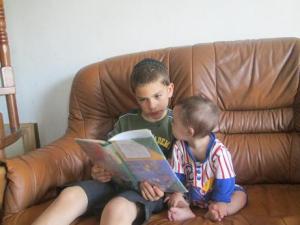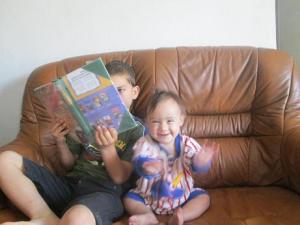I have some homeschooling related questions that I’d like to answer, one of which is, how do I propose to help my children integrate socially in this culture if they aren’t going to be in school? It’s a good question and I’ll address it in a different post! Right now I’ll share about a related point – the perceived importance of a child having a lot of friends and of being popular.
My feeling about this is that being popular is highly overrated and doesn’t correlate well to future success in life. I was delighted to recently read the delightfully titled, The Geeks Shall Inherit the Earth – Popularity, Quirk Theory, and Why Outsiders Thrive After High School – by Alexandra Robbins. Ms. Robbins is a researcher who interviewed high school students and teachers all over the US and shares the results of her extensive research with readers.
What is Quirk Theory? “Many of the differences that cause a student to be excluded in school are the identical traits or real-world skills that others will value, love, respect, or find compelling about that person in adulthood and outside of the school setting.”
In this book, she tracks seven different students who are all struggling with the social situation they are locked into at school (the loner, the gamer, the new girl, the popular girl, the nerd, the weirdo, the geek). She writes about the dynamic of groupthink, in which the actions and thoughts of students are pressed into socially acceptable molds. Not only does this affect students, but there’s something about the school atmosphere in which the teachers are also affected by these values.
Unfortunately, popular people are often not nice people, a concept in the book that I was discussing with the older kids at dinner last night. Read this book if you want to understand this more, but in short, popular people build themselves up by pushing others down. So they become popular not because of their wonderful personalities that shine through and attract people, but because they are powerful and know how to manipulate the social dynamics in their favor. They need to keep others down to keep their power. As soon as I started talking about this, ds14 (who is popular and also nice to people – a number of mothers in the US commented to me about how unusual this combination of qualities was) exclaimed, “I know! There’s this kid I know who’s really popular, but no one really likes him. I wonder sometimes if he has any friends because when he wasn’t around, all the kids talked badly about him.”
She writes about how important it is for society to have people who are creative, free thinkers, willing to stand for what they believe in and more – all qualities that are suppressed and cause people to be marginalized in high school.
As a parent of a daughter who will be homeschooled for eighth grade next year, I’ve done a lot of thinking about high school for her – what are the benefits and what are the disadvantages. This book isn’t about homeschooling at all, but after reading it, I thought to myself that she makes a very, very strong case for homeschooling your children in high school, allowing them to bypass the pettiness of the social scene and have a healthier and more accurate self-image, while being able to spend their time doing things that are meaningful to them.
Whether you have kids who are in high school or not, homeschooling or not, this book is a very engaging and entertaining read. I was happy to have stumbled onto as part of my ebook library selection, which allowed me to read it on my Kindle.
Avivah












